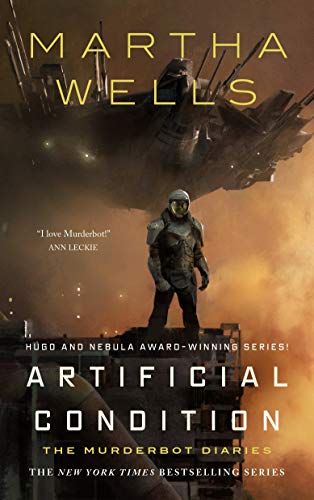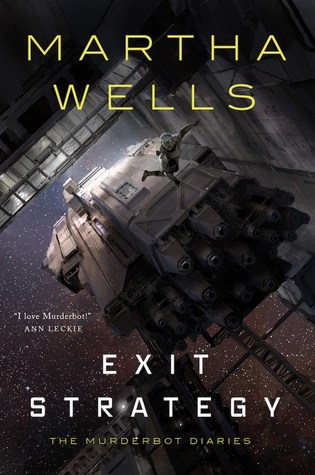
All Systems Red
Re-re-read, August 2022: as my brother and I watched the Wadi Rum dessert open up in front of us, I reminded him that there was no cell reception or WiFi at the camp we were staying at and that he should have (as I told him, far in advance) downloaded whatever media he wanted to consume for the next few days. Unfortunately, he read through everything in his Kindle far too quickly and so asked me if I had anything else to offer so I had to give him my fully loaded Kindle (he read Tomorrow, and Tomorrow, and Tomorrow). To finish this small story, he ended up exclaiming in frustration after day 2 that he had been reading for nine hours in a row and just could not do it anymore, at which point I remembered that I had downloaded all of “Sandman” on Netflix so he gleefully took my iPad instead.
So, in any case, I re-re-read the four novellas that form the start of The Murderbot Diaries. These books are so eminently readable and should form the basis of a syllabus in World Building. With a few deft lines, Wells manages to create an outline of the characters which (knowing what I know now) will entirely suffice for all the additional information we’re going to learn over time. There’s a consistency that doesn’t negate character development, and it’s okay for Murderbot to move too fast too soon and then have to reset.
I realize too, on this go around, that I didn’t have a great grasp on the actual plot dynamics of the latter books. I remembered the plot of this book pretty well, but if you were to ask me what Murderbot’s big secret was? No clue! But it’s nice in a way, because it made me super excited to keep reading 🙂
Artificial Condition
Re-re-read review, August 2022: ART is delightful and deserving, honestly, of its own series. Except that I’m sure in doing so it would solve all of its problems in a second and have nothing of interest to share with us, the puny humans that don’t interest it. Other than its research crew.
interest to share with us, the puny humans that don’t interest it. Other than its research crew.
Or–I would very much read a short novella that describes a member of the research team trying to figure out what on earth happened to ART while it was idling away between various space stations/planets.
Originally I found the novella format to be a bit limited–why can’t there be MORE MURDERBOT, ALWAYS–but on further reflection I think I appreciate the length of each book. There’s a small adventure, with a beginning middle and end, and then we move on to the next one. I think it serves the medium well, and let Wells tell the story without having to burden it unnecessarily.
Rogue Protocol
Re-read, August 2022: when read in a row, these books start to feel like one giant arc with individual acts. Murderbot is definitely getting back together with Preservation, but it needs to sort out what it wants. Even if the easiest way to do so is by figuring out all the things it doesn’t want.
In a move that seems perhaps a bit too convenient, Murderbot runs into another group of error-prone beings consisting of a number of humans and one bot, Miki, who represents everything that Murderbot does not want to be: naïve, innocent, sort of ‘pet-like.’ But Miki is also strong willed and considered part of her group, with a series of imperatives that allow her (her?) to prioritize her wellbeing. It’s a vaguely utopian set up that leaves poor Murderbot all aflutter and unable to clearly categorize the situation (other than to know, still, that it would not want…that).
Of course, since this is a Murderbot killing and murder seem to follow it around. It wouldn’t be a proper novella without some description of leaking fluids or an ominous failure percentage, and this book does indeed deliver that in spades. As Malin noted, there’s a sense that this book is setting up the stage for Murderbot to return to Preservation–it’s now had two examples of ways in which it could integrate into society, and it’s running out of real reasons to avoid Mensah and their crew.
 Original review, September 2020:I think these books always start out as sort of soft three stars for me, and I wonder if maybe the conceit of “misanthropic Murderbot who really would rather Netflix and Chill Alone” has worn off. And then by the end I’m totally all in, can’t bring myself to read slowly enough to fully understand what’s going on, just desperate to continue.
Original review, September 2020:I think these books always start out as sort of soft three stars for me, and I wonder if maybe the conceit of “misanthropic Murderbot who really would rather Netflix and Chill Alone” has worn off. And then by the end I’m totally all in, can’t bring myself to read slowly enough to fully understand what’s going on, just desperate to continue.
I think that’s my biggest criticism, but it’s like 40% for the book and 60% for me. I don’t quite remember/can’t quite keep track of what the Big Conspiracy was/is, and I’m not sure if that’s the book or me. Like, clearly, it’s partially me…butI think that a book should be good at keeping that front of mind? But it’s not on the author if I can’t remember the nuances of the last two books. They’re also like, <2 hours apiece, how much simpler could it possibly be? Britt has it right, read them all back to back.
That being said, I enjoy the inevitable beats for each of these books as we continue to pick out and learn about how this universe works. Murderbot will inevitably get sucked into a new group of soft meaty humans who insist on getting their soft meaty innards in harm’s way. In this go-around, I particularly found amusing the interplay between Murderbot and the human security guards that it encounters, and its constant Not At All Sarcastic mentally notes about the benefits of using human security guards. For example, they can only focus on one thing at a time! And they can react slower to changing situations!
I can sort of see whether the plot for the next novella must be going, and I’m interested to see where the plot moves when the novels get longer (which is what I think happens? I’m too scared to try looking, even at the summaries).
Exit Strategy
Re-read, August 2022: And finally, we come full circle. Murderbot, having ditched Dr. Mensah and Preservation at the end of All Systems Red, is now forced to go back to them having inadvertently caused Dr. Mensah’s imprisonment by GrayCris, the shadowy corporation-slash-political-entity that gives me nightmares of the day when we get to vote between candidates from Faceboogle and TikGram on our space station refuge from an Earth that’s collapsed.
inadvertently caused Dr. Mensah’s imprisonment by GrayCris, the shadowy corporation-slash-political-entity that gives me nightmares of the day when we get to vote between candidates from Faceboogle and TikGram on our space station refuge from an Earth that’s collapsed.
And the thing is, Murderbot still doesn’t really know what it wants or who it wants or what want is. Does it want? Really all it knows is the sweet, sweet oblivion that comes from being absorbed into a show (hello She-Hulk, which I finally got around to watching) (anyone I know who calls it a bore is now getting extreme side eye from me and a line of snarky questions as to whether they have an issue with the She of it all). It knows it has to save Dr. Mensah, and in doing so it gets exposed to any number of uncomfortable gross “feelings.” Such is the price to pay for being a part-biological, part-robot construct.
I do think these books stand on their own, but I also wouldn’t be surprised if some people read these and felt like it was just…too much. Given that we spend all of our time in Murderbot’s head, it’s a very “tell don’t show” sort of book, because Murderbot is actively trying to figure out what it wants via inner monologue. It’s not hard to see where I fall in the spectrum of readers 😉
Original review, September 2020: I love trying to explain these to people, like it’s about a Murderbot who is really just a MisanthropeBot who wants to watch media in the corner and gets sucked into one human escapade after another. With this, the last of the novellas, it’s time to move to the full length novels and I find myself a bit wary of what that means. For now these are the perfect size looks into Murderbot’s life.
Here Murderbot goes back to its first group of humans that aren’t “its” humans you know more like humans it encountered at the same time it happened to have become sentient you know? And I have to say, I was a wee bit heartbroken (Murderbot, that’s a feeling) when Murderbot decided to leave this particular crew of humans at the end of All Systems Red. I’ve enjoyed the other humans its encountered, but this group made my little heart soft.
